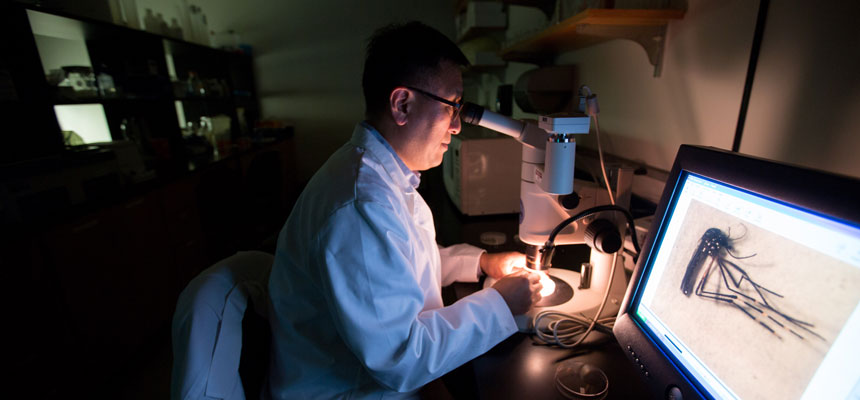Recent rains increase threat of West Nile virus
By Alex Branch

The first West Nile virus death of 2018 in Tarrant County was reported Sept. 21, and a UNT Health Science Center epidemiologist warns that recent rain has caused a sudden increase in mosquito activity.
An older adult with underlying health conditions was the first person to die locally from the mosquito-borne virus this year, according to Tarrant County Public Health. There have been eight cases of West Nile virus reported this year.’
Last year, two West Nile virus deaths were reported in Tarrant County.
Compared to recent years, 2018 had been a mild year for West Nile virus, said Joon-Hak Lee, PhD, Associate Professor of Biostatistics and Epidemiology in the School of Public Health. However, rain that dumped several inches on many parts of Tarrant County in the last few weeks could change that.
Dr. Lee and School of Public Health graduate students partner with the City of Fort Worth throughout the summer to collect and analyze mosquitoes from dozens of residential areas and parks.
“We have had more mosquitoes in the last three weeks, indicating that recent rain events have increased not only breeding habitats for the mosquitoes but suitable environmental conditions for adult mosquito activities,” Dr. Lee said. “Thus, it is recommended to use protective measures in order to avoid infected mosquito bites.”
Areas where the UNTHSC mosquito surveillance team have noted an increase of infected mosquitos include neighborhoods around Arcadia Park, on Precinct Line, and near the east end of John T White Road. The City of Fort Worth announced it has begun spraying for mosquitos in those areas.
“The residents in the area have been informed of the elevated risk of exposure to the virus and the city has been recommended to reduce the risk of exposure by reducing adult mosquito abundance,” Dr. Lee said.
West Nile is a virus most commonly spread to people by mosquito bites. Most infected people do not have symptoms, according to the U.S. Centers for Disease Control and Prevention. About one out of 50 infected people develop a fever and other symptoms. About one out of 150 infected people develop a serious and potentially fatal illness.
Tips to protect yourself and your family:
- Avoid being outdoors for extended periods of time between 8 p.m. and 2 a.m., when mosquito activity is highest.
- Cover arms and legs while outside, and spray DEET insect repellant on shirts and clothing before you head outdoors.
- Eliminate standing water in areas within yards and neighborhoods.
- For added protection of children, spray insect repellant on your own hands first and then rub products onto children’s skin and/or clothing.
- Be aware that mosquitoes thrive in lush, leafy, high-vegetation areas, even those that are well maintained. Trees, flowers, watered lawns and backyards all can attract mosquitoes.
- Keep lighting to a minimum if outside at night to avoid attracting mosquitoes.
- Citronella candles are safe to use but not always effective in preventing mosquito bites.
- The elderly and those with weakened immune systems should use caution, as they can be particularly susceptible to WNV.



![Uyen Sa Nguyen Scaled[58]](https://www.unthsc.edu/newsroom/wp-content/uploads/sites/16/Uyen-Sa-Nguyen-scaled58-145x175.jpg)

Social media